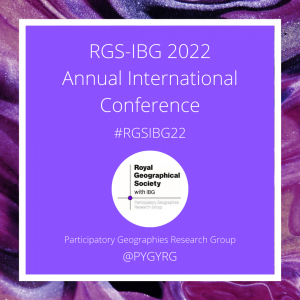CfP RGS-IBG 2022: Re-imagining participatory research: Towards the inclusion of marginalized knowledge(s) in a hybrid world

Sponsorship: Geographies of Children, Youth and Families Research Group (confirmed) & Participatory Geographies Research Group (confirmed)
Convenors: Susanne Börner, University of Birmingham & Universidade de Sao Paulo, s.borner@bham.ac.uk; Peter Kraftl, University of Birmingham, p.kraftl@bham.ac.uk; Leandro Luiz Giatti, Universidade de Sao Paulo, lgiatti@usp.br; Carolina Carvalho, Universidade de Sao Paulo, carvalhocm@gmail.com
Format: hybrid (online and in person), 2 time slots sought (4×20 min presentations plus 20 discussions)
Abstracts (max. 250 words) should be submitted for consideration to s.borner@bham.ac.uk by 17:00 (GMT) Friday 11th March.
Abstract: As covid-19 has disrupted and transformed participatory research processes for the co-production of knowledge, innovative adaptations have occurred to cope with the displacement of the scholar from the field (Auerbach et al., 2022). The shift to remote participatory research methods has raised questions about the adaptation of methods in favour of ‘easier to reach groups’ versus the moral responsibility of the researcher to counteract the exclusion of knowledges of groups in conditions of marginalisation (Liegghio & Caragata, 2021; Giatti 2022). One example is how children and young people in conditions of vulnerability have been at risk of being excluded from remote participatory research due to a lack of access to digital technology and support structures both at school and/or in their families (Börner et al. 2020; Börner et al. 2021). Challenges of exclusion also extend to other (age) groups, such as indigenous populations in rural areas (in Auerbach et al. 2022) or marginalized women in the urban periphery (Marzi 2021). To counteract such processes of exclusion, both in the global North and South, new forms of digital interaction have emerged using informal and formal means of communication; some messy and experimental, some of them more structured (Auerbach et al. 2022; Colom 2021; Börner 2020; Marzi 2021).
This session aims to provide a reflective space for sharing experiences with conducting remote/hybrid participatory research during covid-19. We seek to understand the transformations that have occurred while developing a future vision for what participatory research may look like in an increasingly digital world. We invite a broad range of contributions; however, we encourage submissions focusing on remote/hybrid participatory research with populations in situations of marginalization. We particularly welcome reflections on the intersection with exclusions/inclusions, structures of privilege and power, age (with a special interest in, but not limited to, research with children/youth), digital literacy and research ethics.
We seek to answer questions such as:
- In a digital/hybrid world, does participatory research still matter in the same way? What has been the impact of the shift to the digital on participatory research (particularly when researching with children and youth but also across other age groups)?
- Which role can participatory approaches play in the face of emergent crises permeated by high levels of uncertainties, and what are the challenges?
- What constitutes “good” and “inclusive” participatory practices in a remote/hybrid setting?
- What methodological adaptations and transformations have occurred and where have they opened new opportunities for inclusion?
- How can we reimagine the future of participatory research in a hybrid world? Which support structures are needed, to ensure inclusivity and accessibility?
Abstracts (max. 250 words) should be submitted for consideration to s.borner@bham.ac.uk by 17:00 (GMT) Friday 11th March.
Sustainability, inclusivity & safety statement: We welcome and support the Chair’s statement on Inclusivity and Safety at the conference. We aim to deliver our session in a hybrid format to allow for wider participation, especially from low- and middle-income countries of the global South. If approved for sponsorship, we seek to apply for guest passes for presenters without funding to encourage participation from colleagues from the global South. We also welcome contributions from non-academic presenters, including NGOs, policy, activists, communities and young people involved as co-producers of knowledge in participatory research. Presentations may be delivered in a traditional presentation format or take more creative forms.